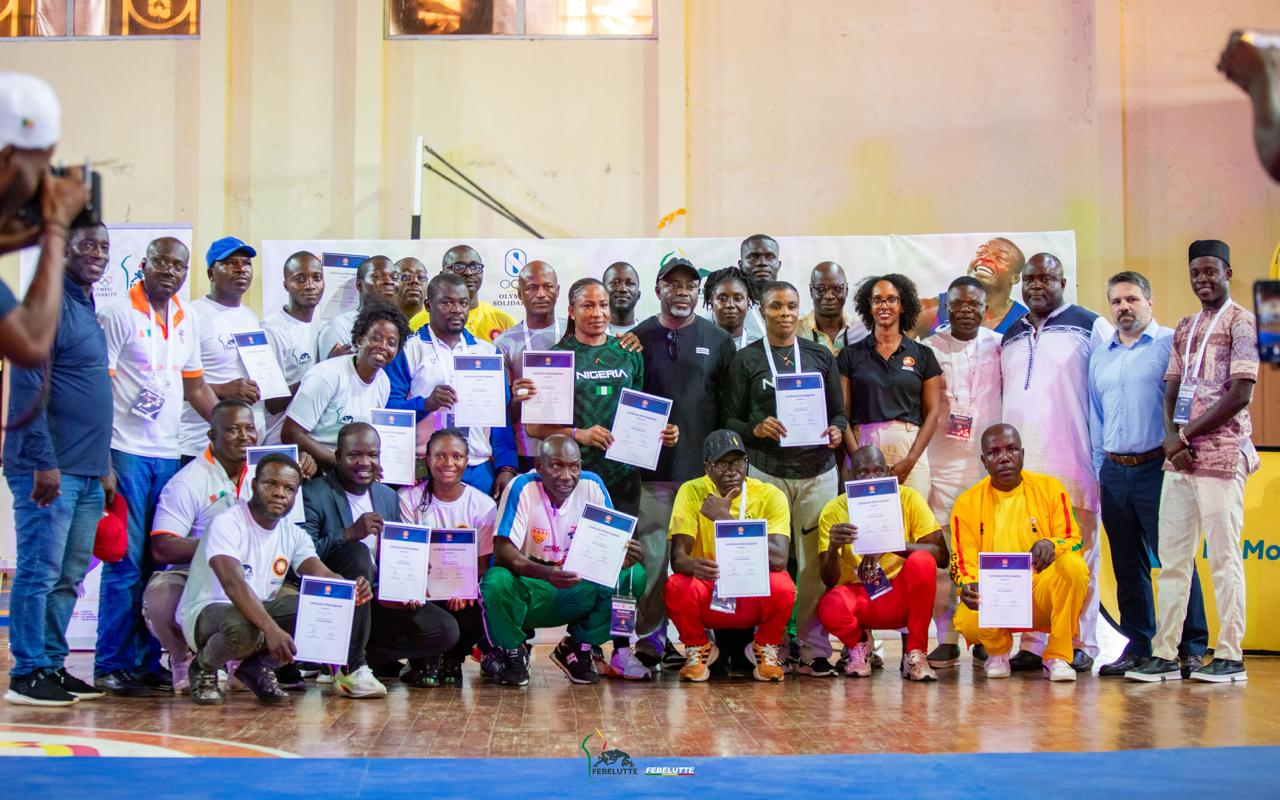Argentina become first country in the Americas to host a Level 3 Coaches Course
Monday, December 2, 2024 - 12:41 By United World Wrestling Press

BUENOS AIRES, Argentina (December 2) —Argentina has become the first country in the Americas to host a Level 3 Coaches Course, organized by United World Wrestling (UWW) and Olympic Solidarity (OS), with the organizational support of the Federación Argentina de Luchas Asociadas (FALA) and the Argentine Olympic Committee (COA). This historic course, held from November 25-29, also stands out as the first-ever Level 3 course conducted in Spanish globally, marking a significant milestone in the development of wrestling coaches in the region.
The course brought together 40 Argentine coaches--including seven women--to enhance their technical and pedagogical skills while embracing a high-performance vision. In addition, Ignacio D'Alessandro (ARG), an international 1S referee and UWW educator, conducted a refereeing clinic, which the participants highly appreciated.
 World champion and Olympic silver medalist Arsen JULFALAKYAN (ARG) walks through par terre strategy at the Level 3 Coaches Course in Argentina. (Photo: United World Wrestling)
World champion and Olympic silver medalist Arsen JULFALAKYAN (ARG) walks through par terre strategy at the Level 3 Coaches Course in Argentina. (Photo: United World Wrestling)
One of the course's highlights was a technical and practical masterclass delivered by Arsen JULFALAKYAN (ARG), UWW Bureau member and Olympic medalist. Julfalakyan shared advanced strategies and innovative exercises that inspired participants to raise their training standards and adopt new perspectives in their daily coaching routines.
The program covered essential topics such as the profile of an excellent coach, tactical strategies, periodization theory and training methodology, and pedagogy for both grassroots and high-performance levels. This comprehensive approach not only strengthened the attendees' theoretical and practical knowledge but also fostered a sense of community and collaboration.
Raúl Trujillo and Filiberto Delgado, renowned Cuban coaches with a distinguished track record of training Pan-American, World, and Olympic champions, led the main sessions.
 Legendary coach Raúl TRUJILLO (CUB) walks through technique during a training session at the Level 3 Coaches Course in Argentina. (Photo: United World Wrestling)
Legendary coach Raúl TRUJILLO (CUB) walks through technique during a training session at the Level 3 Coaches Course in Argentina. (Photo: United World Wrestling)
"Argentina has tremendous potential. During this course, we focused on technical aspects and strategies to evolve and enhance the sport’s development in the country," said Trujillo, the celebrated coach of Mijaín López, a five-time Olympic champion. "The Americas are growing significantly; while Cuba, the United States, and Canada used to dominate, other nations are now achieving remarkable results at World Championships and the Olympic Games."
David Ochoa, Argentina's National Coach and newly accredited UWW Educator, supported the Cuban experts. Ochoa earned this distinction at the most recent Educators’ Course held in Guatemala just weeks prior, and his involvement exemplified Argentina’s commitment to nurturing local talent in wrestling education.
The course opened with an inauguration ceremony at the Argentine Olympic Committee, attended by key figures such as Fernando Rittner, president of FALA; Sebastián Pérez, Secretary General of FALA; Yuri Maier, UWW Sports and Development Officer; Arsen Julfalakyan, UWW Bureau member; and Cristian Roldán, head of administration and responsible for Olympic Solidarity. The practical and theoretical sessions took place at the National Center for High Performance Sports (CENARD), providing a professional and motivating environment for the coaches.
This course marks a significant step in the growth of wrestling across the continent, underscoring the importance of educational programs to elevate coaches’ technical and pedagogical levels. The certificates awarded, endorsed by UWW and Olympic Solidarity, symbolize not only recognition for the participants' efforts but also a commitment to developing the sport in Argentina and Latin America.
The success of this event opens the door to replicating this model in other countries across the continent, contributing to the global advancement of wrestling.



Share your thoughts.
Comments